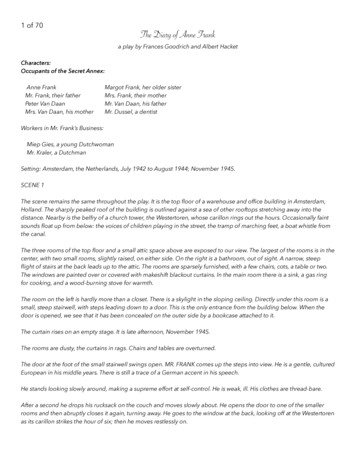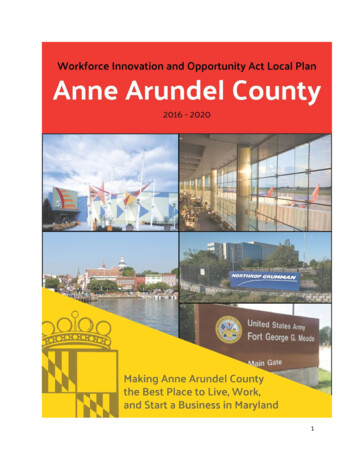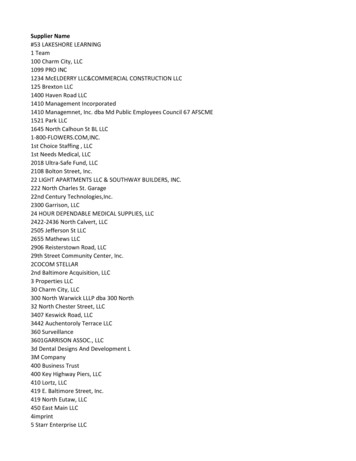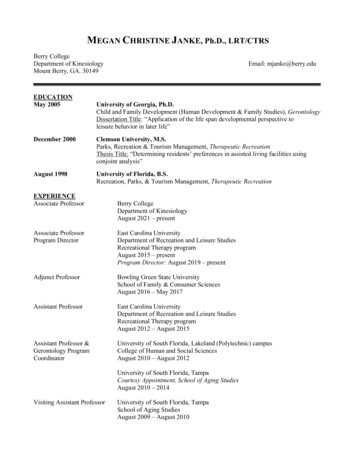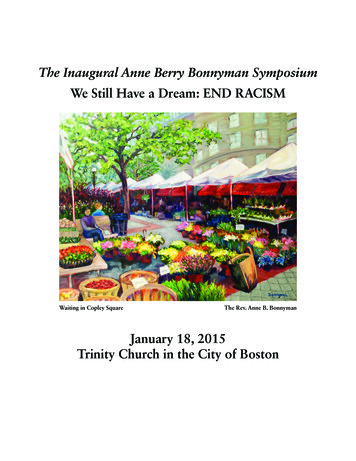
Transcription
The Inaugural Anne Berry Bonnyman SymposiumWe Still Have a Dream: END RACISMWaiting in Copley SquareThe Rev. Anne B. BonnymanJanuary 18, 2015Trinity Church in the City of Boston
Anne B. Bonnyman SymposiumSymposium Mission StatementThe mission of the Anne Berry Bonnyman Symposium is to give Trinity Church a living platform foraddressing systemic racism in our church and community. We pray that the Symposium will sustain uswith courage and strength to take concrete actions towards the creation of an antiracist environmentby presenting public events that promote deep introspection regarding racism and related social justicematters. These events will include various activities to strengthen the resolve and the dedication requiredto create a community anchored in our deepest Christian beliefs. The Symposium honors the ReverendAnne Berry Bonnyman (ret.) for her active commitment to social justice and the eradication of racism.“Jesus was very out there in terms of critiquing asociety that didn’t recognize the dignity of humanbeings. Because I’m a follower of Jesus, that’s myresponsibility as well.”Bishop Thomas ShawA Note about the Reverend Anne B. BonnymanAnne Berry Bonnyman served as Rector of Trinity Church from 2006 to 2011. She is now retired andliving in Asheville, North Carolina, pursuing a lifelong interest in painting. Anne continues her socialjustice work by advocating for marginalized Appalachian children and youth in the NC court systemas a Guardian ad Litem. She also serves on the Board of Trustees of Berea College in Berea, Kentucky.Founded in the 1850s by abolitionists as an inter-racial and co-ed college for the underserved, BereaCollege continues today as a tuition-free, liberal arts college for low-income students from Appalachia.The painting of Copley Square on the cover of today’s program is by Anne Bonnyman.Anne Berry Bonnyman Symposium, January 18, 2015 — 2
Welcome from the RectorWelcome to the Inaugural Anne Berry Bonnyman Symposium:We Still Have a Dream: END RACISMDear friends,Thank you for joining us today for what we hope will be an opportunity forpeople from Trinity Church and across our city to come together to learn, beinspired, and be moved to take effective actions towards facing, healing andending racism.When planning today’s Symposium by members of the Trinity Anti-RacismTeam began, we knew the subject of our conversation would be especiallyrelevant as we honor the Rev. Dr. Martin Luther King, Jr. for his commitmentto a better America. With the recent events in Ferguson, Cleveland, New York,and in our own backyard, this discussion sadly is more urgent than we hadimagined.We pray that the day’s conversations will speak powerfully to participantscoming from many different perspectives, and that it will inform and inspireeffective new initiatives in the long journey we walk on together towardstruth and reconciliation.Faithfully,The Reverend Samuel T. Lloyd IIIRector, Trinity Church in the City of Boston“Do your little bit of good wherever you are;it’s these little pieces of good put together thatoverwhelm the world.”Bishop Desmond TutuAnne Berry Bonnyman Symposium, January 18, 2015 — 3
Your Notes“You can never run away. Not ever.The only way out is in.”‘The Brief Wondrous Life of Oscar Wao’by Junot DiazAnne Berry Bonnyman Symposium, January 18, 2015 — 4
Today’s ProgramInaugural Anne Berry Bonnyman Symposium, January 18, 20151:30 pmOpening Prayer and WelcomeThe Reverend Samuel LloydRector, Trinity Church in the City of Boston1:45 pmKeynote AddressMarian Wright EdelmanFounder and President of the Children’s Defense Fund2:20 pmMusical InterludeTrinity Hallelu Singers*Nedelka Prescod2:30 pmPanel DiscussionModerator: The Honorable Barbara Dortch-OkaraPanelists:Marian Wright EdelmanThe Right Reverend Michael CurryDebby IrvingTim WiseThe Reverend Liz Walker3:40 pmAudience Q & A4:10 pmMusical InterludeTrinity Hallelu SingersNedelka PrescodReflections by attendees4:20 pmCall to ActionThe Reverend Samuel Lloyd4:25 pmConcluding PrayerLET ME NOT LOOK AWAY, O GOD by the Rt. Rev. Steven Charleston**Let me not look away, O God, from any truth I should see. Even if it is difficult, let me face the reality inwhich I live. I do not want to live inside a cosseted dream, imagining I am the one who is always right,or believing only what I want to hear. Help me to see the world through other eyes, to listen to voicesdistant and different, and to educate myself to the feelings of those with whom I think I have nothingin common. Break the shell of my indifference. Draw me out of my prejudices and show me your widevariety.Let me not look away.*Hallelu Singers is a group of Trinity parishioners who offer a cappella music at hospitals, hospices, nursing homes, andother settings, with core repertoire from the African-American hymn, spiritual, and gospel traditions.** Included in the Trinity Anti-Racism Prayer BookAnne Berry Bonnyman Symposium, January 18, 2015 — 5
Panelist BiographiesTHE RIGHT REVEREND MICHAEL BRUCE CURRYMichael Bruce Curry was elected 11th Bishop of the Episcopal Diocese of NorthCarolina on February 11, 2000; he was consecrated on June 17, 2000 in the DukeUniversity Chapel in Durham, North Carolina.Born in Chicago, Illinois on March 13, 1953, Bishop Curry attended public schoolsin Buffalo, New York and graduated from Hobart College in Geneva, New York,in 1975. He received a Masters of Divinity degree from the Yale University DivinitySchool in 1978.Bishop Curry was ordained to the diaconate in June 1978 at St. Paul’s Cathedral in Buffalo, NY by theRt. Reverend Harold B. Robinson and to the priesthood in December 1978 at St. Stephen’s Church,Winston-Salem, North Carolina by the Rt. Reverend John M. Burgess. He was rector at St Stephen’sfrom 1979-1982. He subsequently accepted a call to serve as the rector of St. Simon of Cyrene inLincoln Heights, Ohio, where he served from 1982-1988. In 1988, he was called as rector of St. JamesChurch, Baltimore, Maryland where he served until his election as a bishop in 2000.Bishop Curry’s book of sermons, Crazy Christians, was published in August 2013.THE HONORABLE BARBARA A. DORTCH-OKARA (RET)Judge Barbara Dortch-Okara has been a professor of law at the New England Schoolof Law since January 2013. In December 2013, she was appointed by Governor DevalPatrick to the position of Chair of the State Ethics Commission.Judge Dortch-Okara was a justice of the Massachusetts Superior Court from 1989until her retirement from the bench in 2012. Prior to her elevation to the SuperiorCourt, she served as a justice of the Boston Municipal Court. From 1998 to 2003, sheserved a five-year term as Chief Justice for Administration and Management of theTrial Court.In 1992, Barbara Dortch-Okara joined her husband, Dr. Ebi Okara, as a member of Trinity ChurchBoston. She was elected to Trinity’s Vestry in 2005 and served a four-year term; as a Vestry member, shewas appointed by the Rector to the Trinity Church Anti-Racism Planning and Design Task Force. Thework of this task force resulted in the formation of Trinity’s Anti-Racism Team in 2007; Barbara wasa member of the Anti-Racism Team for three years. She has been a volunteer and rider for the TeamTrinity Ride for Kids outreach ministry for many years.Anne Berry Bonnyman Symposium, January 18, 2015 — 6
Panelist BiographiesMARIAN WRIGHT EDELMANMarian Wright Edelman, Founder and President of the Children’s Defense Fund(CDF), has been an advocate for disadvantaged Americans throughout her professionallife. Under her leadership CDF has become the nation’s strongest voice for childrenand families. The mission of the Children’s Defense Fund’s Leave No Child Behind is to ensure every child a Healthy Start, a Head Start, a Fair Start, a Safe Start, and aMoral Start in life as well as a successful passage to adulthood with the help of caringfamilies and communities.A graduate of Spelman College and Yale Law School, Mrs. Edelman was the firstblack woman admitted to the Mississippi Bar. In 1968, she moved to Washington, D.C., as counselfor the Poor People’s Campaign organized by Dr. Martin Luther King, Jr. She subsequently foundedthe Washington Research Project, a public interest law firm and the parent body of the Children’sDefense Fund. Mrs. Edelman has received numerous honorary degrees and awards, including thePresidential Medal of Freedom (the nation’s highest civilian award) and the Robert F. Kennedy LifetimeAchievement Award. Her writings include: Families in Peril: An Agenda for Social Change; The Measureof Our Success: A Letter to My Children and Yours; I’m Your Child, God: Prayers for Our Children; ICan Make a Difference: A Treasury to Inspire Our Children; and The Sea Is So Wide and My Boat Is SoSmall: Charting a Course for the Next Generation.DEBBY IRVINGDebby Irving was raised in Winchester, Massachusetts during the racially turbulentyears of the 1960s and ‘70s. She received her Bachelor of Arts degree from KenyonCollege and a Master in Business Administration from Simmons College. As generalmanager of Boston’s Dance Umbrella and First Night, and later as a teacher for 25years in Cambridge, Massachusetts, Ms. Irving struggled to make sense of tensionsshe could feel but not explain in racially-mixed settings. She recognized the need tounderstand racism as a systemic issue, and she also recognized that her own whitenesspresented an obstacle to grappling with racism. In 2009, a graduate school course thatshe took at Wheelock College, “Racial and Cultural Identities,” provided the beginnings of answers toher questions and launched her on a journey of discovery. Ms. Irving now devotes herself to exploringwith others the impact that white skin can have on perception, problem solving, and engagement inracial justice work. Her book, Waking Up White, tells the story of her “awakening.”Anne Berry Bonnyman Symposium, January 18, 2015 — 7
Panelist BiographiesTIM WISETim Wise is among the nation’s most prominent anti-racist essayists and educators. Hehas spent the past 20 years speaking to audiences in all 50 states, on over 1000 collegeand high school campuses, at hundreds of professional and academic conferences, andto community groups across the nation. He has also lectured internationally, and he hastrained corporate, government, law enforcement and medical industry professionals onmethods for dismantling racism in their institutions.Wise’s antiracism work traces back to his days as a college activist in the 1980s,fighting for divestment from (and economic sanctions against) apartheid South Africa.Following his graduation from Tulane University, he moved into social justice efforts full-time, as aYouth Coordinator and Associate Director of the Louisiana Coalition Against Racism and Nazism: thiswas the largest of the many groups organized in the early 1990s to defeat the political candidacies ofwhite supremacist and former Ku Klux Klan leader David Duke. From there, he became a communityorganizer in New Orleans’ public housing, and a policy analyst for a children’s advocacy group focusedon combatting poverty and economic inequity. He has served as an adjunct professor at the SmithCollege School of Social Work in Northampton, MA; from 1999-2003 he was an advisor to the FiskUniversity Race Relations Institute in Nashville TN.Wise is the author of six books, including his highly-acclaimed memoir, White Like Me: Reflections onRace from a Privileged Son, as well as Dear White America: Letter to a New Minority. His next book,Culture of Cruelty: How America’s Elite Demonize the Poor, Valorize the Rich and Jeopardize theFuture, will be released in early 2015.Anne Berry Bonnyman Symposium, January 18, 2015 — 8
Panelist BiographiesREVEREND LIZ WALKERA graduate of Harvard Divinity School, the Reverend Liz Walker was installed aspastor of the historic Roxbury Presbyterian Church, Boston in March of 2014.Reverend Walker was called to this ministry after 21 years as Boston’s first AfricanAmerican television news anchor on WBZ-TV, and after 12 years of humanitarianwork in war-torn Sudan where she helped build a school for girls, one of the first of itskind in that region.In the summer of 2001, Reverend Walker traveled to Sudan on a fact-finding missionto explore the controversial slave trade in that country. Reverend Walker was outragedby human rights atrocities in Sudan, and co-founded the humanitarian organization “My Sister’sKeeper,” which focuses on economic and educational initiatives for Sudanese women and girls. Sheproduced an award-winning documentary titled “A Glory from the God” that profiles the work of “MySister’s Keeper.”Reverend Walker is the chair of the Roxbury Presbyterian Church Social Impact Center, a member ofthe Core Strategy Team of the Greater Boston Interfaith Organization (GBIO), and is on the Board forthe New England Chapter of the United Nations International Children’s Emergency Fund.Anne Berry Bonnyman Symposium, January 18, 2015 — 9
BackgroundThe Anti-Racism Team (ART) of Trinity Church was created in 2007 to raise awareness about the sinof racism. We hope to become, individually and collectively, living examples of our Baptismal Covenantwhich calls us to “strive for justice and peace among all people, and respect the dignity of every humanbeing.”Our first task is to learn how we are affected by systemic racism. Training workshops with theCrossroads AntiRacism Organization (based in Chicago) are held periodically to enhance ourunderstanding of systemic racism and to develop long-term strategies to support the transformation ofour community. Dismantling and changing behaviors and attitudes that have existed for hundreds ofyears is slow work; some of us see this as a life-long mission.ART provides opportunities throughout the year to engage parishioners and the public in conversation,to stimulate a more comprehensive understanding of individual, institutional, and cultural racism, andto promote deep healing and true transformation. We see this as part of God’s work.All are welcome to attend: The Anti-Racism Book Club, which reads a wide range of fiction and non-fiction titles (meets onthe third Sunday of each month) Talking Circle, which provides a safe space for dialogue around contemporary issues that relateto race (meets on the first Sunday of the month)In addition to today’s Symposium, other projects that have risen out of the ART’s mission include theART Prayer Book and the work of the History Committee, which was presented to the parish in October2014. The Executive Summary of the History Committee’s published report, “Trinity Church Boston:Facing the Reality of Our Past,” is shared with you below to provide a glimpse into our ongoing work.ART History Project—Trinity Church Boston: Facing the Reality of Our PastBackground: The report that follows is a response to resolutions passed at the General Conventionsof 2006, 2009, and 2012 of the Episcopal Church of the United States, and at the 2006 and 2009Conventions of the Episcopal Diocese of Massachusetts.It also is the result of months of research by a task force representing Trinity’s Anti-Racism Team. Thegoal was to increase the understanding of the depths and origins of institutional racism and Whiteprivilege during Trinity’s nearly 300-year history with the full knowledge that understanding this historywill always be a work in progress.The writers chose twelve topics from various periods of the church’s history to organize their findingsand stimulate reflection and conversation. The work was reviewed numerous times by the Anti-RacismTeam and by the Vestry; their input is reflected in this report. On October 8, 2014, the Vestry formallyaccepted the report; it was presented to the congregation on October 26, 2014 followed by questionsand commentary from Trinity parishioners.It is our hope that, as Trinity’s parishioners gain an increased understanding of the role that systemicracism and White privilege have played in the parish’s history, this knowledge will help us all to createand sustain an anti-racist community now and in the future.Anne Berry Bonnyman Symposium, January 18, 2015 — 10
BackgroundTRINITY CHURCH BOSTON: FACING THE REALITY OF OUR PASTPreface and Executive Summary from the October 2014 ReportBy the History Committee of the Trinity Church Anti-Racism TeamWe are a committee of the Trinity Church Boston Anti-Racism team that set out to research animportant part of our church’s history: its origin, organizational structure and relationship, or lackthereof, to People of Color throughout the church’s nearly 300-year history. Our goal has been to posethe question of how Trinity’s history has influenced our current church community. It is our belief thatfor a mostly White institution such as Trinity to move forward as an anti-racist Christian community,reflecting our commitments in the Baptismal Covenant to “seek and serve Christ in all persons” and“respect the dignity of every human being,” it helps to study and analyze the role of what is called“White privilege” and institutional racism in its past.Therefore, in the full document, we focus on times when individual racial prejudice becomes linked tosystems and institutions of power in a way that gives advantages to the dominant group over others.In the American colonies and then in the United States, systems of power were and are often stacked togive advantage to White people at the expense of other racial groups. This is what is described by theterm “White privilege.” We seek to identify instances of White privilege in the history of Trinity Church.We will also identify instances of our [church’s] and its leaders’ resistance to institutional racism.We acknowledge that the events described in this document took place in the context of their time.We must be careful in applying the 21st century lens of racism and White privilege to earlier times.However, we believe that the racism we describe resulted in great harm to People of Color over threehundred years, and that People of Color who articulated these effects were largely ignored or criticized.When we tell this story, we stand with them as witnesses. This project is at heart about witnessrather than judgment; the point is not to condemn people in the past, but to acknowledge where theaccumulation of their activities has left us as participants in an historical institution, one that spansseveral generations.Peering back into history can make us uneasy; after all, the Spirit has moved our church community ina more loving, inclusive direction, so why would we want to dwell on the past? But the Bible shows usthe importance of remembering our history, complete with all its missteps and heartache. When the Jewswrote about Moses’s leadership and their eventual arrival in the Promised Land, they didn’t edit out theforty years in the desert. Jonah made it to Nineveh, yet we still focus on his detour via a whale. And asChristians we celebrate the resurrection, but we also continue to commemorate the torture and deathJesus suffered on the cross. Paul returned again and again to memories of his work as an oppressor ofChristians, even though he had since become the chief architect of the worldwide Church. The Biblecalls on us to chronicle and study the hurts and errors of our past, in order to hold them up for healingbefore God and learn from them in the future.1Anne Berry Bonnyman Symposium, January 18, 2015 — 11
BackgroundThe Episcopal Church in the United States has undertaken similar efforts with Pastoral Letters in March1994 and March 2006 on the Sin of Racism and with resolutions passed at its General Conventions of2006, 2009, and 2012, calling for each diocese to gather information in its own community on:(1) the complicity of the Episcopal Church in the institution of slavery and in the subsequenthistory of segregation and discrimination;(2) examples of resistance to slavery and discrimination; and(3) the economic benefits derived by the Episcopal Church from the transatlantic slave trade andthe institution of slavery.The national church has recently established two major positions. The first is Missioner on RacialJustice and Reconciliation to oversee [our church’s] activities on racial reconciliation, educationand the development of a policy platform.2 This person is located on the west coast in Seattle. Thesecond position is Missioner for Social Justice and Advocacy Engagement.3 This position, located inWashington, D.C., is expected to “build and support locally-led coalitions for social change according tothe policy position of the Episcopal Church (with a particular focus on racial justice and related issues).The national church also has established an extensive national website and collection of materials onracism; these can be found at www.episcopalarchives.org. These extensive and rich archives are locatedin Austin, Texas.The Diocese of Massachusetts did work in this arena in the years 2008-2012, and has requested thateach church in the diocese look at its own particular history. That is especially important for thechurches that date to the colonial period, including Trinity Church Boston.In our research for this project, we have drawn on the archives of Trinity Church and have read widelyon related subjects. Our work has also been influenced by “The Church Awakens: African Americansand the Search for Justice,” an electronic publication and online exhibit of The Archives of the EpiscopalChurch.Anne Berry Bonnyman Symposium, January 18, 2015 — 12
BackgroundIn summarizing our work, we identified twelve moments in the history of Trinity Church that illustrateaspects of our history related to White privilege, slavery, segregation and also to resistance to theseforces as we seek to understand more clearly the character of the church and its larger community fromthe early 18th century to the 21st century. To meet the requests and requirements of the national churchand the Diocese of Massachusetts, we generally focused our attention on African Americans, startingwith their experience as enslaved Africans and following them to the present time. We understandthat racism and White privilege have affected the lives of other People of Color in the United States,in Boston, and in our church community too; while we were not able to cover their experiences inthis report, we hope it may spark conversations that bring such voices to the fore. We must alsoacknowledge that this effort is evolving, not perfect, and that it reflects the fact that most Americanhistory has been written from the perspective of those in power at the time, primarily wealthy Whitemen. Whether we have suggested connections some don’t see or agree with or have left out connectionsobvious to others, we welcome your comments and suggestions on how to develop this document andexpand the knowledge of our collective past. With your help, recognizing our history can be part oflaying a sure foundation, one on which our beloved church can continue to build its inclusive mission inthe 21st century.Correspondence from Kenzie Bok, a Trinity parishioner and current doctoral student of history at the University ofCambridge, October, 2014.1Episcopal Church Office of Public Affairs. “Kim Named Episcopal Church Missioner for Racial Reconciliation”.Retrieved September 26, 2014 from copal Church Office of Public Affairs. “Wynder Named Missioner for Social Justice and Advocacy Engagement”.Retrieved September 26, 2014 from ne Berry Bonnyman Symposium, January 18, 2015 — 133
Your Notes“And the day came when the risk to remain tight in abud was more painful than the risk it took to blossom.”Anais Nin (attributed)Anne Berry Bonnyman Symposium, January 18, 2015 — 14
An OpportunityAn OpportunityToday’s Symposium was supported by the Anne Berry Bonnyman Symposium Fund at TrinityChurch, a fund that is intended to ensure that the dialogue and critical reflection you haveexperienced today will be possible in future years. We are very grateful to more than 100generous donors for helping make the Symposium a reality; please consider joining them witha gift to the Fund.You may send a check made out to Trinity Church (with “ABB Symposium Fund” inthe memo line) to the attention of Kelsey Rice Bogdan, Trinity Church in the City ofBoston, 206 Clarendon Street, Boston, MA 02116. If you wish to make a gift of securitiesor if you have any questions, please contact Kelsey at 617-536-0944 or by e-mail atkbogdan@trinitychurchboston.orgThank you for joining us today!“We combat racism .not simply to besomeone’s idea of nice, but because failingto do so is failing to reverence God’screation.”The Reverend Patrick WardAnne Berry Bonnyman Symposium, January 18, 2015 — 15
Blue IntrusionCourtesy of Janis PryorJanis Pryor is a Trinity parishionerand member of the Trinity Anti-Racism Team.Trinity Church in the City of BostonCopley Square, 206 Clarendon St, Boston, MA 02116Tel 617-536-0944 Fax 617-536-8916www.trinitychurchboston.orgParish office hours: M-F, 9:00 am-5:00 pm
Founded in the 1850s by abolitionists as an inter-racial and co-ed college for the underserved, Berea College continues today as a tuition-free, liberal arts college for low-income students from Appalachia. The painting of Copley Square on the cover of today's program is by Anne Bonnyman. Anne B. Bonnyman Symposium


